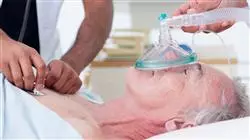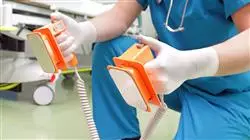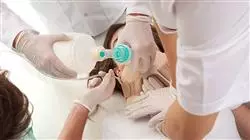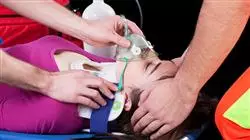University certificate
The world's largest faculty of nursing”
Description
Knowing how to administer the necessary care in each of the phases the patient goes through in the emergency department is a vital competency in the nurse's curriculum”

Hospital emergency care cannot be understood without an approach to the out-of-hospital emergency setting. Therefore, this postgraduate diploma, designed by TECH, will focus on an in-depth approach to both care environments, where triage will play a fundamental role in identifying those patients who are in the most serious and/or vulnerable conditions. Therefore, in this environment, the professional will learn to understand nursing as the professional group in charge of prioritization, together with the rest of the healthcare personnel, who will also have to deal with disaster situations and implement emergency plans with other non-healthcare groups.
In addition, this educational program will delve into the outcome of these complex situations, where not only will the patient have to be cared for with quality, but also to manage the aid and, in special situations, initiate rescue maneuvers. Similarly, this degree will also focus on medical transport, since Nursing professionals are continuously present during the transfer of the patient from the hostile environment in which the event takes place to the hospital itself, providing assistance and care support.
On the other hand, this program will try to go a step further and unpack the advanced life support algorithm that most health professionals are familiar with. In this sense, emphasis will be placed on those special situations where nursing actions have to be adapted, and an in-depth study will be made of those advanced procedures and techniques that are frequently performed in this environment, such as intraosseous line cannulation or the use of the capnograph. The aim of this is that the Nursing professional achieves excellence in the most critical situation for the patient, when they are in cardiorespiratory arrest, but also in the immediate aftermath.
For this reason, this postgraduate diploma describes in detail the post-resuscitation care that this patient should have, since its knowledge and application will be crucial for an early and quality recovery. Additionally, the ethical dilemmas involved in the management of this situation are described, with special mention of the protocol for organ donation and transplantation.
Improve your knowledge in the comprehensive patient approach in Accidents, Advanced Emergencies and Disasters Nursing through this program, where you will find the best educational material with real cases”
This postgraduate diploma in Comprehensive Approach to the Critically Ill Patient and Advanced Resuscitation Care contains the most complete and up-to-date scientific
program on the market. The most important features include:
- The graphic, schematic and practical contents of the course are designed to provide all the essential information required for professional practice
- Exercises where the self-assessment process can be carried out to improve learning
- An algorithm-based interactive learning system, designed for decision-making for patients with nutritional problems
- Theoretical lessons, questions to the expert, debate forums on controversial topics, and individual reflection assignments
- Content that is accessible from any fixed or portable device with an Internet connection
This postgraduate diploma is the best investment you can make when selecting a refresher program, for two reasons: in addition to updating your knowledge in Advanced Care and Resuscitation, you will obtain a qualification from one of the most reputable educational institutions: TECH”
The program's teaching staff includes professionals from the fields of Medicine and Nursing, who bring their work experience to this education, as well as renowned specialists from prestigious reference societies and universities.
Its multimedia content, developed with the latest educational technology, will allow the professional a situated and contextual learning, that is, a simulated environment that will provide an immersive education programmed to prepare in real situations.
The design of this program focuses on Problem Based Learning, by means of which the professional must try to solve the different professional practice situations that are presented throughout the academic course. For this purpose, the professional will be assisted by an innovative interactive video system created by renowned and highly experienced experts in emergency nursing.
The postgraduate diploma allows education through simulated environments, which provide immersive learning programmed to train for real situations"

This 100% online postgraduate diploma will allow you to balance your studies with your professional work while expanding your knowledge in this field"
Objectives
The main objective of the program is the development of theoretical and practical learning, so that the professional achieves in a practical and rigorous way the study of Emergencies and Advanced Disasters in the daily practice of their profession. In this sense, the postgraduate diploma in Comprehensive Approach to the Critically Ill Patient and Advanced Resuscitation Care responds to the continuous demand of professionals for quality study, which serves as a means to use the different types of approaches and treatments as a preventive or therapeutic tool in maintaining the health of their patients.

This refresher program will provide you with a sense of confidence in your daily work, which will help you grow both personally and professionally”
General Objectives
- Prepare students to act appropriately in vital emergency situations according to internationally recognized updated protocols
- Provide accurate theoretical knowledge to be able to understand and correctly apply Basic Life Support and Advanced Life Support maneuvers and treatments
- Master the algorithms for advanced life support in both adult and pediatric patients
- Learn the peculiarities of resuscitation in special situations
- Recognize the main cardiovascular diseases that are highly life-threatening
- Differentiate the multiple therapies and treatments recommended for the resolution of a heart disease event
- Identify time-dependent cardiac pathology to achieve an orderly response from the different resources involved
- Improve the necessary knowledge for the management of patients in need of advanced respiratory support
- Know the basics of mechanical ventilation, the different existing ventilatory therapies, as well as the challenges and complications that the artificial airway itself entails
- Examine alternatives to conventional mechanical ventilation through new ventilatory devices
- Delve into the advanced care applicable to a patient with a respiratory pathology
Specific Objectives
Module 1. Advanced Vital Support
- Gain in-depth knowledge of life support and management of action protocols. AHA and ERC
- Know and understand the chains of survival for the optimal care of patients in different situations of imminent vital risk
- Acquire advanced knowledge of life support in the adult patient
- Acquire advanced knowledge on advanced life support in the pediatric patient
- Obtain advanced knowledge on advanced life support in special situations (pregnant women, traumatic emergencies, drowning, hypothermia and drug intoxication)
- Learn advanced knowledge on advanced life support in the SARS-CoV-2 patient
- Show the procedures performed on the CPR patient and knowledge of the most pioneering techniques
- Delve into the knowledge of the ethical-legal framework for donors
- Review on epidemiology, organization and coordination of transplant system
- Address the main bioethical and legal dilemmas faced by health professionals: no CPR and therapeutic effort limitation
Module 2. Advanced Approach to the Patient with Heart Disease
- Delve into the theoretical and practical knowledge of advanced electrocardiography and its applicability in clinical nursing practice
- Identify and learn the management of bradyarrhythmias Acquire knowledge and skills for patient diagnosis and management
- Increase knowledge on implantable devices (pacemakers, implantable Holter and ICD), identification of indications, results and complications
- Improve skills in the advanced management of cardioversion and defibrillation. Acquire knowledge and skills about the different therapeutic options: cardioversion (electrical and pharmacological) and/or defibrillation
- Delve into the knowledge of new devices and therapies for the management of patients with heart disease
- Identify and classify atherosclerotic disease: angina, SCASET, NSTEACS. Approach ACS and identify the management of the "Heart Attack Code" action protocol
Module 3. Advanced approach to the patient with respiratory pathology
- Develop advanced theoretical knowledge of respiratory physiology and fundamentals of mechanical ventilation
- Identify and recognize the main peculiarities and differences between spontaneous breathing and mechanical ventilation
- Delve into the pathophysiological concepts of gas exchange and respiratory mechanics related to respiratory failure
- Identify the main pathological ventilatory patterns
- List existing devices for advanced airway management (supraglottic devices, Fastrach laryngeal mask, Combitube, etc.)
- Define the Difficult Airway, both anticipated and emergent, main aspects of its detection and management strategy through recommended algorithms
- Review the phases of Rapid Sequence Intubation (RSI)
- Acquire advanced knowledge on the different methods of invasive mechanical ventilation, as well as the different ventilatory methods
- Delve into advanced knowledge of noninvasive mechanical ventilation modalities, their parameters and alarms
- Demonstrate new ventilation devices and therapies in the emergency patient
- Identify the main complications of mechanical ventilation and advanced management of the respiratory patient
- Acquire advanced knowledge in individualized and quality care for the respiratory patient as a basis for excellence in care

Make the most of this opportunity to learn about the latest advances in this subject to apply it to your daily practice"
Postgraduate Diploma in Comprehensive Approach to the Critically Ill Patient and Advanced Resuscitation Care
The care of critically ill patients and those requiring resuscitation is a field of medicine in constant evolution to ensure adequate patient stability. Continuous advances in this field require nurses to keep up to date on the care and strategies that can save patients' lives. Because of this, the Postgraduate Diploma in Comprehensive Approach to the Critically Ill Patient and Advanced Resuscitation Care has been developed, which will provide you with the most cutting-edge knowledge in this area and will favor your professional growth.
Study in a prestigious educational program
If you want to keep up to date with advances in advanced life support and the care needed by patients with severe respiratory and cardiac pathologies, the Postgraduate Diploma in Comprehensive Approach to the Critically Ill Patient and Advanced Resuscitation Care is for you. Thanks to this program, you will obtain a series of up-to-date knowledge that will allow you to perfect your nursing practice. In addition, you will do it through a 100% online methodology that will enable you to study without leaving your home.







